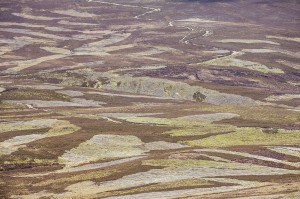
Peatlands are the largest terrestrial carbon store in the UK, 3.2 billion tonnes, and mostly occur on tops of hills where Red Grouse live.
There is growing concern about the environmental impacts of intensive moorland management for the bizarre sport of grouse shooting. One of those concerns (there are others) is the increase greenhouse gas emissions that come from burning the vegetation on peat soils.
Last week the RSPB and others published a new analysis of heather burning in the scientific journal Biological Conservation.
Heather burning was identified in 55 per cent of Special Areas of Conservation (SACs) and 63 per cent of Special Protection Areas (SPAs) assessed in the study, and significantly more burning took place within them than on comparable moorlands outside. These sites are designated under EU legislation for their conservation importance, and governments are charged with protecting them from damage and ensuring that they are restored to the best condition. However, many SACs and SPAs are in unfavourable condition, with burning identified by governments and statutory agencies as a primary reason for this poor status. The RSPB has made a formal complaint to the EU about burning of blanket bogs in the uplands of England.
In the ten year period covered by the study (2001-2011), the number of burns recorded increased rapidly by 11 per cent each year. Other studies have found that the potential number of Red Grouse shooting days in some areas of Britain has risen over a similar period, and moorland management has also intensified.
Martin Harper, Director of Conservation at RSPB said: ‘…many of our uplands are in poor condition, due to intensive land management practices. It’s very worry that burning is increasing, given the damage it can cause and that it occurs in many of our conservation areas. Governments and statutory agencies across Britain need to take action to reduce burning in our uplands rather than allowing them to be increasingly damaged year on year. Although their regulations already advise against burning on blanket bog it is often used on these areas with their consent. These regulations need to be strongly enforced so that uplands are properly protected against this damaging practice.’.
Natural England – are you fit for purpose? Why are you consenting burning within designated nature conservation areas that will damage those sites? Why? And what is the Board of Natural England doing? Natural England is sitting on its hands, somewhere near ‘gate zero’, and failing to designate upland sites but also failing to ensure that appropriate management occurs in those that are designated. What sort of Kafkaesque world exists within Natural England these days?
Defra – you are hopeless! And you appear to be acting for grouse shooting interests rather than for the public good. What type of government department allows unsustainable management to persist in the hills that acts against the public good, against the government’s own nature conservation objectives and against the government’s climate change objectives?
[registration_form]
Speaking of NE, any news on your FOIs?
What is intriguing about all this is that whilst we argue about givens – grouse shooting, sheep farming, nature conservation, a complete new narrative may be developing for the uplands – probably dominated by carbon, but with wildlife, including wildlife tourism, as a subsidiary use. Bearing in mind that every activity in the uplands is subsidised by Government/the (European) taxpayer the potential for a switch of priorities & objectives is considerable because it wouldn’t necessarily involve more money and could save very large amounts.
Government to dispose of public lands again – cheap to preferred cliques one might ask?
Here we go again, Forests, NNRs etc. Profitable operations like Land Registry also on offer ….
Never mind national silver / natural assets how about a clear out of expensive drains on public purse instead?
How about selling or long term lease on the Westminster village & make large proportion of the part time incumbents redundant without golden handshakes? Revoke the 10% pay rise, would we really miss them if they went on strike 😉 Can anyone explain why we need 850 in the second House, bad enough 650 still in the Commons?
Sell knighthoods etc. then in conjunction with the above we could easily raise the required £20bn savings being sought?
That in conjunction with EU savings proposed by Roderick then maybe there’s hope that there will be public not private benefit?
Hmmm… Wondering if a petition to European Parliament to ask for a Europe-wide ban on this practice might get any support? Surely the mighty Europe can’t turn a blind eye to environmental damage on this scale by one of its member states.
Tim – it’s an idea. But the UK is, even now, struggling with dealing with a complaint about this issue made by the RSPB in October 2012. October 2012 for heavens sake!!!
This is an excellent piece of research published by RSPB and others.
Today I see another piece of research, also involving the RSPB, being reported by the BBC website as climate change impacting on curlews (they like uplands) http://www.bbc.com/news/science-environment-33612294
And of course yesterday saw the launch of the eagerly anticipated follow up petition to ban grouse shooting.
So based on the above research, isn’t the logical next step for organisations who base their conservation decisions on sound science to back the new petition?
I have signed your new petition for the banning driven grouse moors. The continuing and increasing desecration of our grouse moors and their widlife just screams for action by Government and Natural England. The whole issue is fast becoming one of the finest examples of where vested interests in Government prevent right and corrective action being taken.